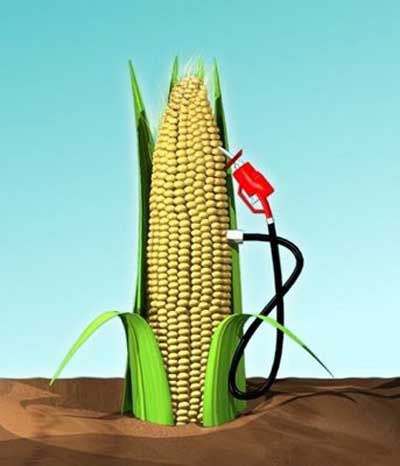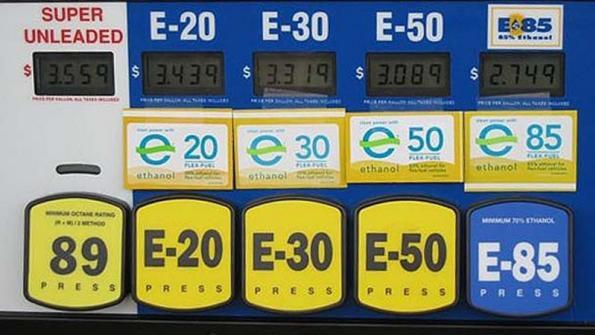The addition of ethanol to gasoline has now been a political hot potato in the U.S. for more than a decade.
Joined by cosponsors from both sides of the aisle, U.S. Representative Bob Goodlatte [R-VA] introduced two bills in February that together would eliminate the Renewable Fuels Act passed in 2007 and ban E15 from the nation's gasoline pumps.
The bills have been referred to the House Energy and Commerce Committee, from which they seem unlikely to emerge any time soon. Broadly similar bills have also been introduced in the U.S. Senate.
DON'T MISS: Senate Bill Introduced To End Ethanol Mandate For Gasoline (Feb 2015)
Forbes commentator Bill Tucker suggests that such bills will go exactly nowhere amidst the huge sums spent on lobbying Congress.
The passage of the Renewable Fuel Standard (RFS) mandated that increasing volumes of the biofuel be blended into the nation's fuel supply.
The bill assumed demand for gasoline would increase steadily over the coming years. Instead, gas consumption peaked almost 10 years ago and has largely declined since then.

Corn Ethanol Pump
In 2011, the EPA approved gasoline with 15 percent ethanol (E15) for use in cars built in 2001 or later, saying it wouldn't damage 21st-century cars.
That move came under fire from a variety of sources, including groups representing users of older small engines in power equipment, boats, off-road vehicles, and old cars.
ALSO SEE: Flex-Fuel Vehicles And E85: Why Ethanol Isn't Making Its Numbers
It also stalled due to the substantial costs required of gas-station owners, who had to install new "blender pumps" that could alternately dispense today's E10 for older vehicles and the new E15 for qualifying cars.
The incentive that would lead consumers to choose E15 also remained unclear.
The majority of U.S. gasoline sold today is now E10, meaning ethanol use will soon hit a "blendwall" at which no more can physically be added into the fuel supply unless its percentage in gasoline rises.
Goodlatte's bills are HR 703, the Renewable Fuel Standard Elimination Act, and HR 704, the RFS Reform Act of 2015.
The first bill would simply repeal the entire RFS act, eliminating the mandate for blending biofuels into the U.S fuel supply altogether.

Pump with multiple ethanol/gasoline blends.
The 31 organizations signed up to lobby on HR 703 include oil companies, automakers General Motors and Nissan, agricultural groups, Koch Brothers, and several others.
MORE: EPA Resets Ethanol Rules To Reflect Reality: Cellulosic Sources Don't Exist
HR 704, the second bill, would prohibit the sale of gasoline blends with more than 10 percent ethanol as a method of meeting the volume requirements imposed by the RFS.
It would also prohibit ethanol produced from corn from being used to meet the RFS volume targets.
Finally, it would mandate that the EPA alter RFS volume requirements for cellulosic ethanol at actual production levels of the fuel, which today are nominal.
It has a broadly similar list of lobbyists.
This is not Goodlatte's first attempt to eliminate E15 and the RFS.
![Sign for 'ethanol-free premium gas' at Stewart's, Port Ewen, NY, Mar 2015 [photo: William Benson] Sign for 'ethanol-free premium gas' at Stewart's, Port Ewen, NY, Mar 2015 [photo: William Benson]](https://images.hgmsites.net/lrg/sign-for-ethanol-free-premium-gas-at-stewarts-port-ewen-ny-mar-2015-photo-william-benson_100505241_l.jpg)
Sign for 'ethanol-free premium gas' at Stewart's, Port Ewen, NY, Mar 2015 [photo: William Benson]
Not surprisingly, Bob Dinneen, president and CEO of the Renewable Fuels Association, called the bills "a reckless paean to Big Oil" and "a step backward in energy policy."
He suggested that the cellulosic ethanol industry is "burgeoning" and that the bills would "cut the legs out" from underneath that industry.
RELATED: EPA Proposal Would Cut 2014 Ethanol Mandate By 20 Percent (Nov 2013)
Meanwhile, last week the EPA unveiled a proposal to cut the volumes of ethanol to be blended into the fuel supply below those required under the RFS for 2014, 2015, and 2016.
The agency has been late in setting 2014 ethanol volumes, now proposed to be 15.9 billion gallons, the actual amount used. The volume is below the 20.3 billion gallons required by the NFS.
The new proposal similarly cuts 2015 and 2016 levels by roughly 25 percent. The agency will accept comments on the proposed rules through July 27.
It said it hopes to finalize the three-year levels by November, and release 2017 targets on time next year.
_________________________________________________













